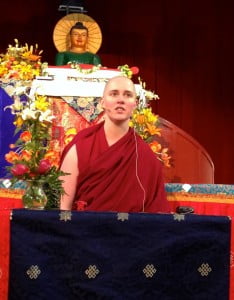By Ven Cristiana Ciampa Tsomo

Thank you, and thanks to IMI, for giving space for us bikshunis to share our experiences, since this would enhance people’s understanding of the Buddhadharma. Actually yes, after the IMI last newsletter I felt the need to say something about bikshuni vows, given my little but very positive experience on the matter as a gelongma for 5 years, by having received the full vows in the Vietnamese Temple Giao Hoi Phat Giao Viet Nam Thong Nhat – Au Chau in France, from a complete assembly of Abbot, Abbess, Bikshus and Bikshunis. As a bikshuni I am a junior, who still has her own limited vision and lacks complete training and interactions with the Sangha, because of always living isolated in retreat. Yet I write this paper out of enthusiasm for the things which I understand to be good about bikshuni vows, and I happily accept any correction or interaction about the following contents.
Some time ago I wrote to Kyabje Lama Zopa Rinpoche in order to inform Him about my step of taking full vows, and His response was really warm and encouraging. I told Rinpoche that, when I knew about the opportunity to become a bhikshuni, I didn’t feel interested at first, but after that moment, I had many very auspicious dreams of purification and increasing of virtue. I felt it was strange because I tend to be easily uncontrolled in certain aspects of my behaviour, and so I thought I was not suitable for more rules to be added to my life. But my Lama Lodro Tulku gave me a lot of encouragement; His mo came out very good, and finally I decided to take ordination.
I also told Rinpoche that in these last years I noticed that my efforts to keep the full vows, instead of increasing my worldly concerns, had the opposite effect: it made me a little bit less proud, less angry and less wild, and my connection with the Sangha has become more peaceful and sincere in the rare times I can stay with them (because for many years I have been living as a hermit nun in retreat, far away from Pomaia).
Having said that, it seems important to me that the recognition of equal opportunities for monks and nuns takes place in supporting, teaching, exchanging, and above all trusting. Where fully ordained nuns are a novelty – as in our Tibetan tradition – a lot of trust in them is needed on the part of the laity, the male monastic community and the novice nuns themselves in order to support them. I already know that there is an effort from other IMI nuns to clarify the authenticity of the bikshuni lineage, and this is so precious also in relation to our connection with the Guru, since it’s up to us to offer materials to Lama Zopa Rinpoche about the integrity of His female sangha; in the past Rinpoche reported what an abbess in Taiwan told Him about her one nunnery, while He never said he was sure that an uninterrupted bikshuni lineage is lacking at all in the world. This matter is very important, because we know that the complete Sangha exists only if bikshunis exist and vice-versa.The detailed vows of the bikshunis are essentially a skilful way of preserving and enhancing the harmony between members of the female sangha, between the female and male ordained sangha. Furthermore, the vows provide a way of relating to the laity as virtuous practitioners and protectors, enabling the laity to acquire merit in contact with the sangha.
Full vows are interdependent vows. Interdependence has to be lived and practiced, not avoided. The world is strong in virtue if the Buddha’s Sangha is strong. The Buddha’s Sangha is strong if the four pillars remain. In IMI the four pillars are already present, but one of them has yet to be enhanced through open communication.
There are of course many issues about that; I will just briefly touch on a couple of these:
The militaristic conception that can unconsciously undermine confidence in bikshunis – that is, the projection that the main point of taking full vows is to attain “a higher rank” – must not prevail in non-bikshunis and, in my opinion, doesn’t represent the category of bikshunis in general. Such a projection (or false pervasion) is destructive of the Sangha of bikshus, bikshunis, shramana and shramanerika. Gelongmas being the first in line at pujas and teachings is the last thing that should interest us: it is a formality—just a nice, virtuous formality, which should be happily embraced out of substantial respect for the whole sangha itself; it is not the super-acknowledgment of an individual’s higher external “position” as one person.
Another issue is about the supposed hardships of keeping bikshuni vows in the modern times, which in the mind of many would render the nuns almost automatically not good or pure enough when it comes to keeping the vows. This is a big misunderstanding, in the same way as it would be about the corresponding situation for the gelongs. The point is that there are valid reasons for keeping the vows, so we should appreciate the vows and desire to keep them. And when conditions in the modern world make it impossible to keep them strictly—for example, if we need to handle money—the Vinaya has skilful methods for remedying such transgressions.
I will stop here for now. It’s already such a miracle for me that we can start to share a bit of this matter with the sangha. Of course I am a beginner as a bikshuni, I don’t have much experience, so I just spoke from my heart. Many thanks to bhikshuni Sangye Khadro who helped me by making suggestions about how to clarify some confused points in my draft and corrected my very poor English, and thanks to all the readers too.

